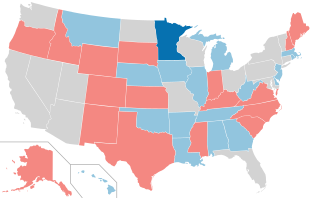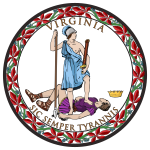
John William Warner III was an American lawyer and politician who served as the United States Secretary of the Navy from 1972 to 1974 and as a five-term Republican U.S. Senator from Virginia from 1979 to 2009. Warner served as Chairman of the Senate Armed Services Committee from 1999 to 2001, and again from 2003 to 2007. He also served as the Chairman of the Senate Rules Committee from 1995 to 1999.

The 2002 United States Senate elections featured a series of fiercely contested elections that resulted in a victory for the Republican Party, which gained two seats and thus a narrow majority from the Democratic Party in the United States Senate. The Senate seats up for election, known as class 2 Senate seats, were last up for regular election in 1996. The election cycle was held on November 5, 2002, almost fourteen months after the September 11, 2001 attacks.

The 1996 United States Senate elections were held on November 5, with the 33 seats of Class 2 contested in regular elections. Special elections were also held to fill vacancies. They coincided with the presidential election of the same year, in which Democrat Bill Clinton was re-elected president.

The 1990 United States Senate elections were held on Tuesday, November 6, 1990, with the 33 seats of Class 2 contested in regular elections. Special elections were also held to fill vacancies. The Democratic Party increased its majority with a net gain of one seat from the Republican Party. The election cycle took place in the middle of President George H. W. Bush's term, and, as with most other midterm elections, the party not holding the presidency gained seats in Congress.

The 1984 United States Senate elections were held on November 6, with the 33 seats of Class 2 contested in regular elections. They coincided with the landslide re-election of President Ronald Reagan in the presidential election. In spite of the lopsided presidential race, Reagan's Republican Party suffered a net loss of two Senate seats to the Democrats, although it retained control of the Senate with a reduced 53-47 majority. Democrats defeated incumbents in Illinois and Iowa, and won an open seat in Tennessee, while Republicans defeated an incumbent in Kentucky.

The 1982 United States Senate elections were held on November 2, 1982. They were elections for the United States Senate following Republican gains in 1980. The 33 Senate seats of Class 1 were up for election in 1982. A total of four seats changed hands between parties, with Democrats winning seats in New Jersey and New Mexico, and Republicans taking seats in Nevada and the seat of the lone independent, Senator Harry Byrd Jr., in Virginia. Democrats made a net gain of one seat bringing them to 46 seats, while Republicans stayed at 54 seats for a majority. However, the Democratic gain in New Jersey replaced a Republican that had been appointed earlier in the year.

The 1978 United States Senate elections were held on November 7, in the middle of Democratic President Jimmy Carter's term. The 33 seats of Class 2 were contested in regular elections. Special elections were also held to fill vacancies.

The 1976 United States Senate elections was an election for the United States Senate. Held on November 2, the 33 seats of Class 1 were contested in regular elections. They coincided with Democrat Jimmy Carter's presidential election and the United States Bicentennial celebration. Although almost half of the seats decided in this election changed parties, Carter's narrow victory did not provide coattails for the Democratic Party. Each party flipped seven Senate seats, although, one of the seats flipped by Democrats was previously held by a Conservative.

The 1964 United States Senate elections were held on November 3. The 33 seats of Class 1 were contested in regular elections. Special elections were also held to fill vacancies. They coincided with the election of President Lyndon B. Johnson by an overwhelming majority, to a full term. His Democratic Party picked up a net two seats from the Republicans. As of 2023, this was the last time either party has had a two-thirds majority in the Senate, which would have hypothetically allowed the Senate Democrats to override a veto, propose constitutional amendments, or convict and expel certain officials without any votes from Senate Republicans. In practice, however, internal divisions effectively prevented the Democrats from doing so. The Senate election cycle coincided with Democratic gains in the House in the same year.

The 1958 United States Senate elections were elections for the United States Senate which occurred in the middle of President Dwight D. Eisenhower's second term. Thirty-two seats of Class 1 were contested in regular elections, the new state of Alaska held its first Senate elections for its Class 2 and 3 seats, and two special elections were held to fill vacancies.

The 2006 United States Senate election in West Virginia was held November 7, 2006. Incumbent Democrat Robert Byrd won re-election to a ninth term. He was sworn in on January 3, 2007. However, he died in office on June 28, 2010, before the end of his term. This was Byrd's closest re-election.

The 1912–13 United States Senate elections were held on various dates in various states. They were the last U.S. Senate elections before the ratification of the Seventeenth Amendment in 1913, establishing direct elections for all Senate seats. Senators had been primarily chosen by state legislatures. Senators were elected over a wide range of time throughout 1912 and 1913, and a seat may have been filled months late or remained vacant due to legislative deadlock. Some states elected their senators directly even before passage of Seventeenth Amendment. Oregon pioneered direct election and experimented with different measures over several years until it succeeded in 1907. Soon after, Nebraska followed suit and laid the foundation for other states to adopt measures reflecting the people's will. By 1912, as many as 29 states elected senators either as nominees of their party's primary or in conjunction with a general election.

The 2008 United States Senate election in West Virginia was held on November 4. Incumbent Senator Jay Rockefeller won re-election to a fifth term in a landslide, defeating Republican Jay Wolfe by a 27-point margin. Despite this overwhelming win, this remains the last time that a Democrat has won West Virginia's Class 2 U.S. Senate seat. In both of the two subsequent elections for the seat, Republicans have swept every single county.

The 2004 United States elections were held on Tuesday, November 2, 2004, during the early years of the war on terror and after the 2003 invasion of Iraq. Republican President George W. Bush won re-election and Republicans retained control of Congress.

The 1996 United States Senate election in Virginia was held on November 5, 1996. Incumbent Republican U.S. Senator John Warner won re-election to a fourth term over Democratic challenger Mark Warner (unrelated), who later served as Governor of Virginia from 2002 to 2006 and won this Senate seat in 2008 after John Warner declined to run for re-election that year.

The 1990 United States Senate election in Virginia took place on November 5, 1990. Incumbent Republican U.S. Senator John W. Warner won re-election to a third term. No Democrat filed to run against him as he won every single county and city in the state with over 60% of the vote. Independent Nancy B. Spannaus got 18% of the vote, as she was the only other candidate on the ballot besides Warner.

The 1994 United States Senate election in Virginia was held November 8, 1994. Incumbent Democratic U.S. Senator Chuck Robb won re-election to a second term versus Republican nominee Oliver North, a Marine Corps veteran famous for his role in the Iran–Contra affair.

The 1984 United States Senate election in West Virginia was held on November 6, 1984. Incumbent Democratic U.S. Senator Jennings Randolph chose to retire instead of seeking re-election to a fifth term, and was succeeded by West Virginia Governor Jay Rockefeller, who defeated Republican John Raese in one of the closer races of the year.
Edythe "Edie" Colton Harrison is an American politician who served as a member of the Virginia House of Delegates from 1980 to 1983. She lost renomination to Tom Moss in 1982 after the state's House district maps were redrawn. In 1984, she ran for United States Senate, losing to the Republican incumbent, John Warner. She was the first woman nominated for statewide office by the Virginia Democratic Party.

West Virginia held elections on November 3, 2020. Elections for the United States Senate and House, as well as for several statewide offices including the governorship were held. These elections were held concurrently with the 2020 U.S. presidential election and other elections nationwide. The Democratic and Republican party primary elections were held on June 9, 2020.



















